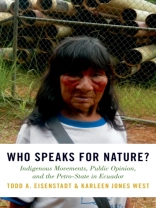In 2009, Ecuador became the first nation ever to enshrine rights for nature in its constitution. Nature was accorded inalienable rights, and every citizen was granted standing to defend those rights. At the same time, the government advanced a policy of "extractive populism, " buying public support for mineral mining by promising that funds from the mining would be used to increase public services. This book, based on a nationwide survey and interviews about environmental attitudes among citizens as well as indigenous, environmental, government, academic, and civil society leaders in Ecuador, offers a theory about when and why individuals will speak for nature, particularly when economic interests are at stake. Parting from conventional social science arguments that political attitudes are determined by ethnicity or social class, the authors argue that environmental dispositions in developing countries are shaped by personal experiences of vulnerability to environmental degradation. Abstract appeals to identity politics, on the other hand, are less effective. Ultimately, this book argues that indigenous groups should be the stewards of nature, but that they must do so by appealing to the concrete, everyday vulnerabilities they face, rather than by turning to the more abstract appeals of ethnic-based movements.
Todd A. Eisenstadt & Karleen Jones West
Who Speaks for Nature? [EPUB ebook]
Indigenous Movements, Public Opinion, and the Petro-State in Ecuador
Who Speaks for Nature? [EPUB ebook]
Indigenous Movements, Public Opinion, and the Petro-State in Ecuador
Mua cuốn sách điện tử này và nhận thêm 1 cuốn MIỄN PHÍ!
Ngôn ngữ Anh ● định dạng EPUB ● Trang 496 ● ISBN 9780190908973 ● Nhà xuất bản Oxford University Press ● Được phát hành 2019 ● Có thể tải xuống 3 lần ● Tiền tệ EUR ● TÔI 7036530 ● Sao chép bảo vệ Adobe DRM
Yêu cầu trình đọc ebook có khả năng DRM












